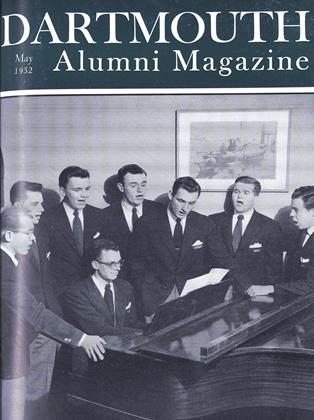With the current spring season Dartmouth enters upon a new baseball regime, under the direction of Bob Shawkey, onetime great pitcher for the New York Yankees in the palmy days of the 1920's and an active participant in organized baseball during his entire adult life. The soft-spoken Mr. Shawkey took over when the snow still lay deep on the diamond and, after the customary frustrating sessions in the cage, piloted an un- usually large squad south with him for the spring trip. The team did reasonably well in the midsouth, largely against service opposition, and as we write the opening day is still a week away. With a new coach, who did not have a chance to watch his charges on the field until a few weeks ago, the situation is still somewhat fluid as far as personnel is concerned. Nevertheless, we may hazard certain suggestions as to the way the team will shape up by the time the league season starts.
In the infield, two positions are virtually certain and the other two are still very much up in the air. At first, the veteran Ev Parker is starting his third year and, as a slick fielder and a potential long-ball hitter, should continue at that spot for the season. At the other side of the infield, Jack Hart is also playing his third and last year with the varsity. His. fielding, his timely hitting, and his overall inspirational play at the hot corner put him far ahead of anyone else. At second, there is a hot fight between the veteran Curt Richards and an enterprising sophomore named Bob McGrath, who sparked his freshman team. At shortstop, there are no less than three leading contenders, with the veterans Jack Hall and Dana Farrisee contending with the promising sophomore Don Swanson. Whatever else happens, the club should be deep in infielders.
In the outfield, Captain Jim Churchill leads the contenders, with veterans Bill Johnson, John Brower, Emil Schnell, Steve Meterparel, and Warren Cassidy competing for the other two positions. Each of the above is a letter winner, so that the gardens will be patrolled by experienced players no matter who gets the final nod from Coach Shawkey. This is a heavily experienced team, with every position having men who have played there before. The same goes for the chores behind the plate, where senior Buzz Barton is holding forth as first catcher, a role he has filled off and on for the past three years. His hitting on the southern trip suggests that he will continue as the No. 1 receiver.
We now come to the big question mark of the current Dartmouth aggregation, namely, the pitching. In college baseball, pitching is a good part of the battle, a fact that, incidentally, suggests why Coach Shawkey should have what it takes to develop a winning aggregation. The leading pitcher is Frank Logan, an elongated hurler who was outstanding two years ago as a sophomore, only to languish the whole of last season on the bench with a sore arm. Logan went all the way to pitch a four-hitter on the southern trip, which suggests that he may be ready. The second pitcher is junior Pete MacKinnon, who looked great as a freshman two years ago and something less than great as a sophomore last year. He also has the stuff if he can manage it, and he could be an excellent college pitcher. The third man who should see starting action is sophomore Don Belcher, who is an excellent, if as yet untried, prospect. There are, of course, other hopefuls among the nine pitchers who went south, but the season will largely stand or fall on the efforts of Logan, MacKinnon, and Belcher.
The Ivy League is offering an innovation this spring, in the form of a two-section race. The organization will be divided into a northern and a southern division, each consisting of five teams which will each play every other team in the division twice. The winners in each division will then play a sort of Ivy League world's series for the championship. It should come as no surprise to note that Dartmouth is in the northern division, along with Yale, Harvard, Brown, and Army. In the southern division, Columbia, Princeton, Cornell, Navy, and Pennsylvania will compete. During the regular season, the Green will engage only the other four teams in the northern division. They will have to wait for the championships to play anybody else.
 View Full Issue
View Full Issue
More From This Issue
-
 Class Notes
Class Notes1918
May 1952 By ERNEST H. EARLEY, DONALD L. BARR, RICHARD A. HOLTON -
 Class Notes
Class Notes1929
May 1952 By F. WILLIAM ANDRES, EDWIN C. CHINLUND, GEORGE B. REDDING -
 Article
ArticleAshurnazirpal's Story
May 1952 By DONALD P. HANSEN '53 -
 Class Notes
Class Notes1917
May 1952 By KARL W. KOENIGER, DONALD BROOKS, HOWARD A. STOCKWELL -
 Article
Article25 Years After
May 1952 By JAMES D. BINDER '52 AND THOMAS L. PAPST '52 -
 Article
ArticleThe Undergraduate Year
May 1952 By KENNETH J. ROMAN JR. '52
FRANCIS E. MERRILL '26
-
 Sports
SportsLACROSSE
May 1946 By Francis E. Merrill '26 -
 Sports
SportsBASEBALL
July 1947 By Francis E. Merrill '26 -
 Sports
SportsSWIMMING
January 1948 By Francis E. Merrill '26 -
 Sports
SportsBASKETBALL
February 1948 By Francis E. Merrill '26 -
 Sports
SportsTennis
July 1951 By Francis E. Merrill '26 -
 Sports
SportsTennis
June 1952 By Francis E. Merrill '26







